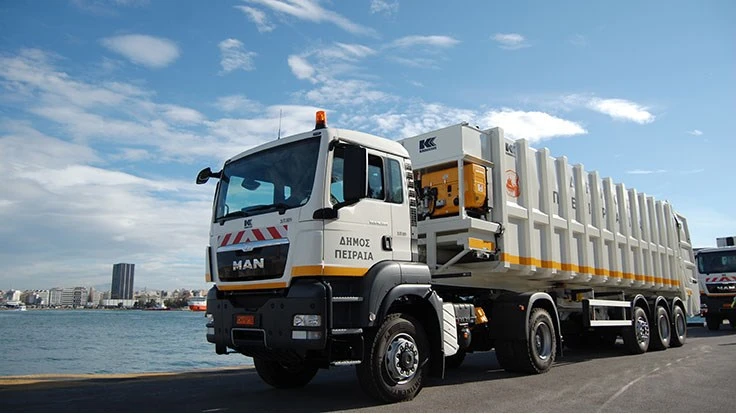
The municipality of Piraeus is in the Attica region of Greece is a port city near Athens that experiences seasonally different municipal solid waste (MSW) generation rates. Each year, thousands of holiday makers visit the port for excursions on Greek cruises. The port also takes in industrial imports and exports products from Greece.
To properly handle the ongoing streams of waste and recyclables, the municipality operates a 24-hour collection service to help keep material volumes moving.
The municipality provides a door-to-door waste collection system for residents in some parts of the city. This system is used where the streets are narrower and there is little room for the placement of a communal collection point to house 1,000-liter (264-gallon) containers. Residents place their waste or recyclables for collection outside their properties in either a 240-liter (64-gallon) wheeled bin, provided by Piraeus municipality, or inside a black waste collection sack.
The main streets of the municipality have communal collection points along them. There, green 1,000-liter containers for non-recyclable waste and a 1,000-liter blue container for commingled dry recyclables are placed near each other.
Piraeus operates two sizes of waste collection vehicles. For the narrower streets, a fleet of MAN TGL 10-and 11-metric ton Kaoussis CRV 1000 collection vehicles with 7 cubic meters (9.1 cubic yards) of capacity are used. For the larger streets, a fleet of larger Mercedes Econic 1828 18-metric ton Kaoussis CRV 2000 models, or Volvo FL6 and Volvo FLE models, are used.
The municipality also has several Volvo FM9 340 26-metric ton Kaoussis RL300 rear-loading press type compaction bodies fitted with Kaoussis comb and trunnion bin lifting equipment. These are the largest rigid type waste collection vehicles operated by Piraeus and are used for collecting waste in areas of the city where waste volumes are at their highest.
Waste collection service for narrower streets begins at midnight. Each waste collection vehicle is staffed with a driver and two waste collectors. The two collectors empty the 240-liter containers from each property. Full bags of waste put out by residents are also deposited into the hopper of the waste collection vehicle by the collectors. Any 660-liter (175-gallon) and 1,000-liter containers placed along the collection route also are emptied by the collection crew.
The collection of waste for the larger streets starts between 2:00 and 3:00 in the morning. Collection vehicles used for this are again staffed with a driver and two collectors. The vehicles service the 1,000-liter green waste containers in communal collection points.
Smaller satellite waste collection vehicles deliver their waste to Piraeus municipality’s own waste transfer station, outside the city but close to the city’s main road network. On arrival, all vehicles are weighed to establish their net payload. Once weighed, the vehicles proceed to an elevated platform to discharge their load. The waste is compressed to the rear of the waste transfer trailer on receipt of each fresh load of waste delivered by the satellite waste collection vehicle until the trailer is fully loaded
The development of the municipality’s own waste transfer station has improved the efficiency of its waste collection rounds as well as helped to reduce carbon emissions in the satellite waste collection vehicles by not having to travel long distances to discharge their loads.
The commingled dry mixed recyclables collected from the blue 1,000-liter containers in Piraeus are delivered to the EMAK facility in Ano Liosia, Greece, operated by the regional solid waste authority. There, the materials are separated using both manual and mechanical techniques before being baled for shipment to consumers.
Piraeus municipality staff members say the system has been optimized by maximizing productivity in the sizes of its waste collection rounds and reviewing the distance each collection vehicle travels per day. The collection vehicles’ fuel consumption, fuel usage and repair and maintenance costs are continually monitored to reduce external operating costs as much as possible.
Latest from Waste Today
- Waste Robotics partners with Australian engineering firm
- California to add new recycling sites for CRV redemption
- Recycling industry celebrates relaunch of the Congressional Recycling Caucus
- Sourgum launches services in Mississippi
- CenterPoint Energy invests in RNG made from Minnesota food waste
- Brightmark, Lewis Salvage partnership processes 1M pounds of medical plastics
- Eco Waste Solutions will deliver waste disposal system to US Air Force
- Teaching kids the value of recycling





